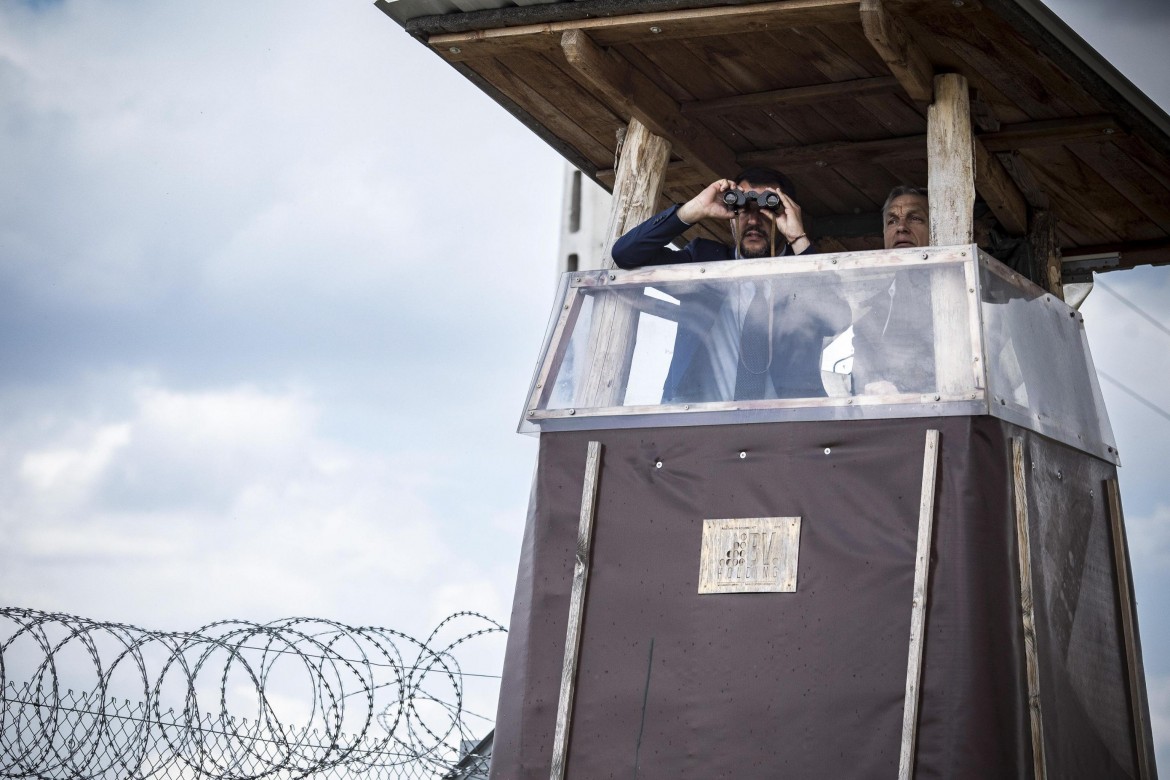Analysis
In Hungary, Salvini offered Orbán promises but few commitments
It was a meeting of two leaders who are thriving at home but find themselves cornered in Europe.

The only thing missing was a reciprocal pat on the back with his friend Viktor Orbán. Otherwise, the sovereignist propaganda photo-op that we saw on Thursday in Budapest had all the rhetorical repertoire, catchphrases and vacuous promises that might be expected from two leaders in an election campaign.
Right after getting off the plane, with a big smile, Matteo Salvini boarded a helicopter to the border between Hungary and Serbia, where the Hungarian prime minister built the first border fence four years ago, 175 km long and 12 feet high, after the Syrian civil war had caused the displacement of hundreds of thousands of refugees. To this day, this barrier is still seen as a disgrace across Europe, but Orbán claims it was this “wall” that stopped the migrant “invasion.”
Then, posing for the cameras as always, Salvini surveyed the border through binoculars with Orbán at his side. “I congratulate you for the manner in which, in a very short time, quickly and decisively, Hungary has secured 600 kilometers of borders. Italy has the exact same position,” commented the Interior Minister with satisfaction at the end of his “inspection.”
Salvini’s trip to Hungary was more than just a visit, it was a bet on a hypothetical future that could arrive soon. It was a meeting of two leaders who are thriving at home but find themselves cornered in Europe. The two don’t have to worry about their internal opponents. The polls have the Lega growing more and more, while just a week ago—according to an announcement by Orbán’s party Fidesz—one million Hungarians joined an anti-migrant program set up by the Hungarian prime minister and inventor of “illiberal democracy.”
The true unknown for both politicians is what will happen on May 26, when the vote for the new European Parliament will take place—and, most importantly, what role the EPP will play in an attempt to build “a Europe further to the right” than today. “We trust that the new Europe, from May 27, will protect its external borders, because the problem is not redistributing migrants, but avoiding that they come in the first place,” the Lega Nord minister said.
Orbán approves of that sentiment, but even though Fidesz has been suspended from the EPP since March, it isn’t considering leaving the group, as Salvini would like. There will be more talks after the elections, according to the Hungarian Prime Minister, whose plans don’t allow for anything more than an alliance with the group that the Lega is putting together with a number of other European nationalist forces. As for the EPP, Orbán’s hope is to try to influence its policies: “We need to find another path through cooperation with Europe’s right wing,” he said, particularly with those political forces who are against immigration.
It was all a bit like a Budapest remake of the same scenes we saw last year in Milan, on Aug. 28, when Orbán came to Italy to meet Salvini and left without giving the leader of the Lega Nord much of anything. In short, fighting together for the same goals is fine, as long as the two continue on their separate paths. Meanwhile, proposals are ostensibly being brought back which had already been shelved long ago, like opening migrant identification centers outside the borders of the EU or threatening to review the trade agreements with non-EU countries which don’t facilitate the repatriation of their citizens.
The comments coming from the rest of Europe highlighted the isolation of the two nationalist leaders. Annegret Kramp-Karrenbaur, the leader of the German CDU, warned Orbán in no uncertain terms: “If Orbán chooses to move further away from the EPP, there is no way back to the EPP for him and Fidesz.” She also poured cold water on Orbán’s hopes to change the EPP’s policies: “Since the suspension in March, Orbán and Fidesz no longer have any influence on EPP policy.” Even Jean Claude Juncker was unusually harsh: “those who promote foolish nationalism will pay the price for it,” said the President of the European Commission in an interview on Sunday about the upcoming elections.
The Budapest meeting was also an opportunity for a new confrontation within the Italian yellow-green majority. None other than Luigi Di Maio himself went on the offensive: “It makes no sense to come here in Italy, like the Lega does, and say ‘we’ll fight austerity,’ and then ally yourself with political forces such as Orbán’s, who was calling Juncker and demanding more austerity for Italy when we were actually fighting it.”
Originally published at https://ilmanifesto.it/salvini-in-ungheria-da-orban-promesse-ma-pochi-impegni/ on 2019-05-03
